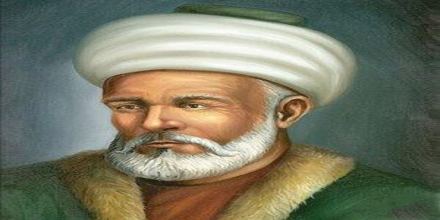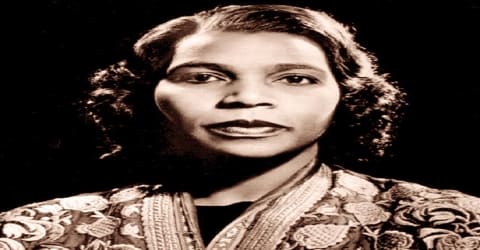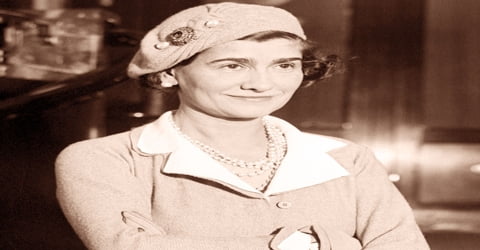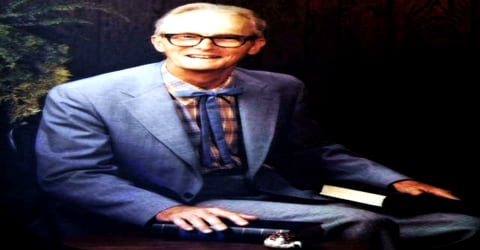Al-Farabi – Muslim Philosophers (c.872-c.950)
Full name: Abū Naṣr Muḥammad ibn Muḥammad Fārābī
Arabic: ابو نصر محمد بن محمد الفارابي
Title: The Second Teacher
Date of birth: c. 872
Place of birth: Fārāb on the Jaxartes (Syr Darya) in modern Kazakhstan or Faryāb in Khorāsān (modern day Afghanistan).
Date of death: c. 950
Place of death: Damascus
Ethnicity: Persian or Turkic
Era: Islamic Golden Age
Religion: Islam
Main interest(s): Metaphysics, Political philosophy, law, Logic, Music, Science, Ethics, Mysticism, Epistemology
Early Life
Abū Naṣr Muḥammad ibn Muḥammad Fārābī (Arabic: ابو نصر محمد بن محمد الفارابي) was born on c.872, in Farab. He was a renowned philosopher and jurist who wrote in the fields of political philosophy, metaphysics, ethics and logic. He was also a scientist, cosmologist, mathematician and music scholar.
In Arabic philosophical tradition, he is known with the honorific “the Second Master”, after Aristotle. He is credited with preserving the original Greek texts during the Middle Ages because of his commentaries and treatises, and influencing many prominent philosophers, like Avicenna and Maimonides. Through his works, he became well-known in the East as well as the West. The main-belt asteroid 7057 Al-Fārābī was named in his honor.
Al-Farabi was known to the Arabs as the ‘Second Master’ (after Aristotle), and with good reason. It is unfortunate that his name has been overshadowed by those of later philosophers such as Ibn Sina, for al-Farabi was one of the world’s great philosophers and much more original than many of his Islamic successors. A philosopher, logician and musician, he was also a major political scientist.
Al-Farabi has left us no autobiography and consequently, relatively little is known for certain about his life. His philosophical legacy, however, is large. In the arena of metaphysics he has been designated the ‘Father of Islamic Neoplatonism’, and while he was also saturated with Aristotelianism and certainly deploys the vocabulary of Aristotle, it is this Neoplatonic dimension which dominates much of his corpus. This is apparent in his most famous work, al-Madina al-fadila (The Virtuous City) which, far from being a copy or a clone of Plato’s Republic, is imbued with the Neoplatonic concept of God. Of course, al-Madina al-fadila has undeniable Platonic elements but its theology, as opposed to its politics, places it outside the mainstream of pure Platonism.
As a philosopher, Farabi was the first to separate philosophy from theology. It is difficult to find a philosopher both in Muslim and Christian world from Middle Ages onwards who has not been influenced by his views. He believed in a Supreme Being who had created the world through the exercise of balanced intelligence. He also asserted this same rational faculty to be the sole part of the human being that is immortal, and thus he set as the paramount human goal the development of that rational faculty. He considerably gave more attention to political theory as compared to any Islamic philosopher.
When major Arabic biographers decided to write comprehensive entries on Farabi in the 6th-7th/12th-13th centuries, there was very little specific information on hand; this allowed for their acceptance of invented stories about his life which range from benign extrapolation on the basis of some known details to tendentious reconstructions and legends. Most modern biographies of the philosopher present various combinations of elements drawn at will from this concocted material. The sources from the 6th/12th century and later consist essentially of three biographical entries, all other extant reports on Farabi being either dependent on them or even later fabrications: 1) the Syrian tradition represented by Ibn Abī Uṣaibiʿa. 2) The Wafayāt al-aʿyān wa-anbāʾ abnāʾ az-zamān (“Deaths of Eminent Men and History of the Sons of the Epoch”; trans. by Baron de Slane, Ibn Khallikan’s Biographical Dictionary, 1842–74) compiled by Ibn Khallikān. 3) the scanty and legendary Eastern tradition, represented by Ẓahīr-al-Dīn Bayhaqī.
From incidental accounts it is known that he spent significant time in Baghdad with Christian scholars including the cleric Yuhanna ibn Haylan, Yahya ibn Adi, and Abu Ishaq Ibrahim al-Baghdadi. He later spent time in Damascus, Syria and Egypt before returning to Damascus where he died in 950-1.
Farabi traveled to many distant lands throughout his life and gained many experiences a lot, due to which he made so many contributions for which he is still remembered and acknowledged. Inspite of facing many hardships, he worked with full dedication and made his name among the popular scientists of history.
Educational Information
In the auto-biographical passage about the appearance of philosophy preserved by Ibn Abī Uṣaibiʿa, Farabi has stated that he had studied logic,medicine and sociology with Yūḥannā b. Ḥaylān up to and including Aristotle’s Posterior Analytics, i.e., according to the order of the books studied in the curriculum, Fārābī said that he studied Porphyry’s Eisagoge and Aristotle’s Categories, De Interpretatione, Prior and Posterior Analytics. His teacher, Yūḥannā b. Ḥaylān, was a Christian cleric who abandoned lay interests and engaged in his ecclesiastical duties, as Fārābī reports. His studies of Aristotelian logic with Yūḥannā in all probability took place in Baghdad, where Al-Masudi tells us Yūḥannā died during the caliphate of al-Moqtader (295-320/908-32). He was in Baghdad at least until the end of September 942 as we learn from notes in some manuscripts of his Mabādeʾ ārāʾ ahl al-madīna al-fāżela, he had started to compose the book in Baghdad at that time and then left and went to Syria. He finished the book in Damascus the following year (331), i.e., by September 943). He also lived and taught for some time in Aleppo. Later on Farabi visited Egypt; and complete six sections summarizing the book Mabādeʾ in Egypt in 337/July 948-June 949.
Career
The main influence on al-Farabi’s philosophy was the neo-Aristotelian tradition of Alexandria. A prolific writer, he is credited with over one hundred works. Amongst these are a number of prolegomena to philosophy, commentaries on important Aristotelian works (such as the Nicomachean Ethics) as well as his own works. His ideas are marked by their coherency, despite drawing together of many different philosophical disciplines and traditions. Some other significant influences on his work were the planetary model of Ptolemy and elements of Neo-Platonism, particularly metaphysics and practical (or political) philosophy (which bears more resemblance to Plato’s Republic than Aristotle’s Politics).
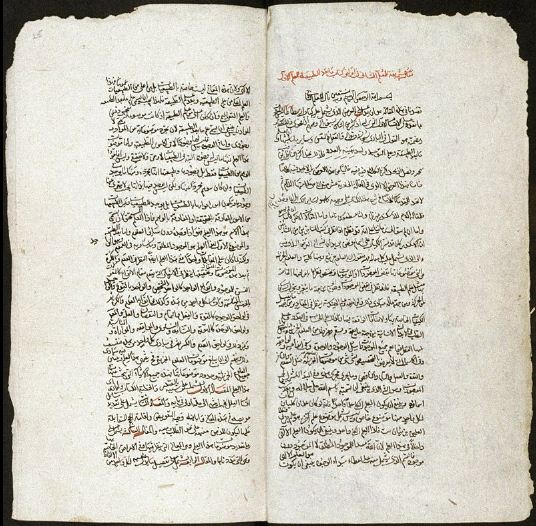
Pages from a 17th-century manuscript of Al-Farabi’s commentary on Aristole’s metaphysics
In the handing down of Aristotle’s thought to the Christian west in the middle ages, al-Farabi played an essential part as appears in the translation of Farabi’s Commentary and Short Treatise on Aristotle’s de Interpretatione that F.W. Zimmermann published in 1981. Farabi had a great influence on Maimonides, the most important Jewish thinker of the middle ages. Maimonides wrote in Arabic a Treatise on logic, the celebrated Maqala fi sina at al-mantiq
Al-Farabi as well as Ibn Sina and Averroes have been recognized as Peripatetics (al-Mashsha’iyun) or rationalists (Estedlaliun) among Muslims. However, he tried to gather the ideas of Plato and Aristotle in his book “The gathering of the ideas of the two philosophers”.
According to Adamson, his work was singularly directed towards the goal of simultaneously reviving and reinventing the Alexandrian philosophical tradition, to which his Christian teacher, Yuhanna bin Haylan belonged. His success should be measured by the honorific title of “the second master” of philosophy (Aristotle being the first), by which he was known. Interestingly, Adamson also says that he does not make any reference to the ideas of either al-Kindi or his contemporary, Abu Bakr al-Razi, which clearly indicates that he did not consider their approach to Philosophy as a correct or viable one.
Later in his work, Al-Farabi laid down in Platonic fashion the qualities necessary for the ruler, he should be inclined to rule by good quality of a native character and exhibit the right attitude for such rule. At the heart of Al-Farabi’s political philosophy is the concept of happiness in which people cooperate to gain contentment. He followed the Greek example and the highest rank of happiness was allocated to his ideal sovereign whose soul was ‘united as it were with the Active Intellect’. Therefore Farabi served as a tremendous source of aspiration for intellectuals of the middle ages and made enormous contributions to the knowledge of his day, paving the way for the later philosopher and thinkers of the Muslim world.

Al-Farabi’s cosmology is essentially based upon three pillars: Aristotelian metaphysics of causation, highly developed Plotinian emanational cosmology and the Ptolemaic astronomy. In his model, the universe is viewed as a number of concentric circles; the outermost sphere or “first heaven”, the sphere of fixed stars, Saturn, Jupiter, Mars, the Sun, Venus, Mercury and finally, the Moon. At the centre of these concentric circles is the sub-lunar realm which contains the material world. Each of these circles represent the domain of the secondary intelligences (symbolized by the celestial bodies themselves), which act as causal intermediaries between the First Cause (in this case, God) and the material world. Furthermore these are said to have emanated from God, who is both their formal and efficient cause.
Al-Farabi has a number of political divisions for his world. He identifies, for example, three types of society which are perfect and grades these according to size. His ideal virtuous city, which gives its name to the whole volume, is that which wholeheartedly embraces the pursuit of goodness and happiness and where the virtues will clearly abound. This virtuous city is compared in its function to the limbs of a perfectly healthy body. By stark contrast, al-Farabi identifies four different types of corrupt city: these are the ignorant city (al-madina al-jahiliyya), the dissolute city (al-madina al-fasiqa), the turncoat city (al-madina al-mubaddala) and the straying city (al-madina al-dalla). The souls of many of the inhabitants of such cities face ultimate extinction, while those who have been the cause of their fall face eternal torment. In itemizing four corrupt societies, al-Farabi was surely aware of Plato’s own fourfold division of imperfect societies in the Republic into timarchy, oligarchy, democracy and tyranny. The resemblance, however, is more one of structure (four divisions) rather than of content.
At the heart of al-Farabi’s political philosophy is the concept of happiness (sa’ada). The virtuous society (al-ijtima’ al-fadil) is defined as that in which people cooperate to gain happiness. The virtuous city (al-madina al-fadila) is one where there is cooperation in achieving happiness. The virtuous world (al-ma’mura al-fadila) will only occur when all its constituent nations collaborate to achieve happiness. Walzer reminds us that both Plato and Aristotle held that supreme happiness was only to be gained by those who philosophized in the right manner. Al-Farabi followed the Greek paradigm and the highest rank of happiness was allocated to his ideal sovereign whose soul was ‘united as it were with the Active Intellect’. But Walzer goes on to stress that al-Farabi ‘does not confine his interest to the felicity of the first ruler: he is equally concerned with the felicity of all the five classes which make up the perfect state’ (Walzer, in introduction to al-Madina al-fadila (1985: 409-10)). Farabian political philosophy, then, sits astride the saddle of Greek eudaimonia, and a soteriological dimension may easily be deduced from this emphasis on happiness. For if salvation in some form is reserved for the inhabitants of the virtuous city, and if the essence of that city is happiness, then it is no exaggeration to say that salvation is the reward of those who cooperate in the achievement of human happiness. Eudaimonia/sa’ada becomes a soteriological raft or steed.
Human beings are unique in al-Farabi’s vision of the universe because they stand between two worlds: the “higher”, immaterial world of the celestial intellects and universal intelligibles, and the “lower”, material world of generation and decay; they inhabit a physical body, and so belong to the “lower” world, but they also have a rational capacity, which connects them to the “higher” realm. Each level of existence in al-Farabi’s cosmology is characterized by its movement towards perfection, which is to become like the First Cause; a perfect intellect. Human perfection (or “happiness”), then, is equated with constant intellection and contemplation.
Al-Farabi influenced many other thinkers as well. A glance at the period between ah 256/ad 870 and ah 414/ad 1023 and at four of the major thinkers who flourished in this period serves to confirm this: Yahya ibn ‘Adi, Abu Sulayman al-Sijistani, Abu ‘l-Hasan Muhammad ibn Yusuf al-‘Amiri and Abu Hayyan al-Tawhidi may all be said to constitute in one form or another a ‘Farabian School’. The Christian Monophysite Yahya ibn ‘Adi studied in Baghdad under al-Farabi and others. Like his master, Yahya was devoted to the study of logic; like his master also, Yahya held that there was a real link between reason, ethics and politics. Al-Sijistani was a pupil of Yahya’s and thus at one remove from al-Farabi; nonetheless, he shared in both his master’s and al-Farabi’s devotion to logic, and indeed was known as al-Sijistani al-Mantiqi (The Logician). In his use of Platonic classification and thought, al-Sijistani reveals himself as a true disciple of al-Farabi. Although al-‘Amiri appears to speak disparagingly of al-Farabi at one point, there can be no doubt about al-Farabi’s impact on him. Indeed, al-‘Amiri’s works combine the Platonic, the Aristotelian and the Neoplatonic. Finally, Abu Hayyan al-Tawhidi, a pupil of both Yahya and al-Sijistani, stressed, for example, the primacy of reason and the necessity of using logic. Like others of the Farabian School outlined above, al-Tawhidi contributed towards a body of thought the primary constituents of which were the soteriological, the ethical and the noetic.
The practical application of philosophy is a major concern expressed by al-Farabi in many of his works, and while the majority of his philosophical output has been influenced by Aristotelian thought, his practical philosophy is unmistakably based on that of Plato. In a similar manner to Plato’s Republic, al-Farabi emphasizes that philosophy is both a theoretical and practical discipline; labeling those philosophers who do not apply their erudition to practical pursuits as “futile philosophers”. The ideal society, he says, is one directed towards the realization of “true happiness” (which can be taken to mean philosophical enlightenment) and as such, the ideal philosopher must hone all the necessary arts of rhetoric and poetics to communicate abstract truths to the ordinary people, as well as having achieved enlightenment himself. Al-Farabi compares the philosopher’s role in relation to society with a physician in relation to the body; the body’s health is affected by the “balance of its humours” just as the city is determined by the moral habits of its people. The philosopher’s duty, he says, is to establish a “virtuous” society by healing the souls of the people, establishing justice and guiding them towards “true happiness”.
Though he was mainly an Aristotelian logician, he included a number of non-Aristotelian elements in his works. He discussed the topics of future contingents, the number and relation of the categories, the relation between logic and grammar, and non-Aristotelian forms of inference. He is also credited with categorizing logic into two separate groups, the first being “idea” and the second being “proof”.
Al-Farabi also considered the theories of conditional syllogisms and analogical inference, which were part of the Stoic tradition of logic rather than the Aristotelian. Another addition al-Farabi made to the Aristotelian tradition was his introduction of the concept of poetic syllogism in a commentary on Aristotle’s Poetics.
Al-Farabi also wrote a commentary on Aristotle’s work, and one of his most notable works is Al-Madina al-Fadila (اراء اهل المدينة الفاضلة و مضاداتها) where he theorized an ideal state as in Plato’s The Republic. Al-Farabi represented religion as a symbolic rendering of truth, and, like Plato, saw it as the duty of the philosopher to provide guidance to the state. Al-Farabi incorporated the Platonic view, drawing a parallel from within the Islamic context, in that he regarded the ideal state to be ruled by the prophet-imam, instead of the philosopher-king envisaged by Plato. Al-Farabi argued that the ideal state was the city-state of Medina when it was governed by the prophet Muhammad as its head of state, as he was in direct communion with Allah whose law was revealed to him.
Al-Farabi had great influence on science and philosophy for several centuries, and was widely considered second only to Aristotle in knowledge (alluded to by his title of “the Second Teacher”) in his time. His work, aimed at synthesis of philosophy and Sufism, paved the way for the work of Ibn Sina (Avicenna).
Al-Farabi wrote a short treatise “On Vacuum”, where he thought about the nature of the existence of void. He may have carried out the first experiments concerning the existence of vacuum, in which he investigated handheld plungers in water. He concluded that air’s volume can expand to fill available space, and he suggested that the concept of perfect vacuum was incoherent.
Al-Farabi wrote a book on music titled Kitab al-Musiqa (The Book of Music). In it, he presents philosophical principles about music, its cosmic qualities, and its influences.
He also wrote a treatise on the Meanings of the Intellect, which dealt with music therapy and discussed the therapeutic effects of music on the soul.
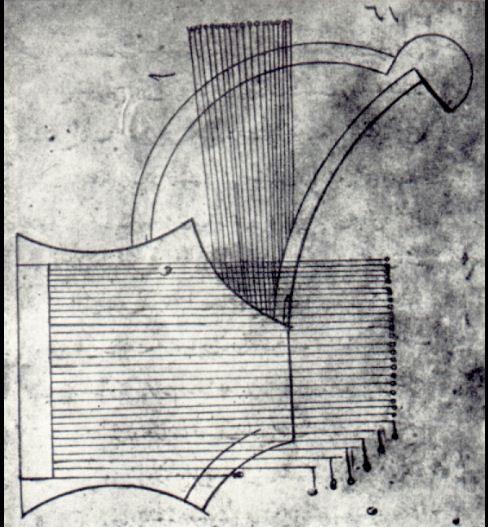
Illustration from Kitāb al-mūsīqā al-kabīr. Drawing of a musical instrument, called shahrud
Personal Information
His name was Abū Naṣr Muḥammad b. Muḥammad Farabi, as all sources, and especially the earliest and most reliable, Al-Masudi, agree. In some manuscripts of Fārābī’s works, which must reflect the reading of their ultimate archetypes from his time, his full name appears as Abū Naṣr Muḥammad b. Muḥammad al-Ṭarḵānī, i.e., the element Ṭarḵān appears in a nisba (family surname or attributive title).
His birthplace is Fārāb on the Jaxartes (Syr Darya) in modern Kazakhstan or maybe Fāryāb in Greater Khorasan (modern day Afghanistan). The older Persian Pārāb (in Ḥudūd al-ʿĀlam) or Fāryāb (also Pāryāb), is a common Persian toponym meaning “lands irrigated by diversion of river water”. By the 13th century, Fārāb on the Jaxartes was known as Otrār.
Medieval Arab historian Ibn Abī Uṣaibiʿa (died in 1269)—al-Farabi’s oldest biographer—mentions in his ʿOyūn that al-Farabi’s father was of Persian descent. Al-Shahrazūrī who lived around 1288 A.D. and has written an early biography also states that Farabi hailed from a Persian family. According to Majid Fakhry, an Emeritus Professor of Philosophy at Georgetown University, Farabi’s father “was an army captain of Persian extraction.” As noted by Dimitri Gutas, Farabi has in a number of his works references and glosses in Persian and Sogdian (and even Greek but not Turkish). Sogdian has also been suggested as his native language and the language of the inhabitants of Fārāb. Muhammad Javad Mashkoor argues for an Iranian-speaking Central Asian origin. A Persian origin has been discussed by other sources as well.
The oldest known reference to a Turkic origin is given by the medieval historian Ibn Khallikān (died in 1282), who in his work Wafayāt (completed in 669/1271) states that Farabi was born in the small village of Wasij near Fārāb (in what is today Otrar, Kazakhstan) of Turkic parents. Based on this account, some modern scholars say he is of Turkic origin.

Notable work(s)
- kitāb al-mūsīqī al-kabīr (“The Great Book Of Music”)
- ārā ahl al-madīna al-fāḍila (“The Virtuous City”)
- kitāb iḥṣāʾ al-ʿulūm (“On The Introduction Of Knowledge”)
- kitāb iḥṣāʾ al-īqā’āt (“Classification Of Rhythms”)
Death
He died a bachelor in Damascus in 339 A.H. /950 A.D. at the age of 80 years. In Syria, he was supported and glorified by Sayf al-Dawla, the Hamdanid ruler of Syria.
